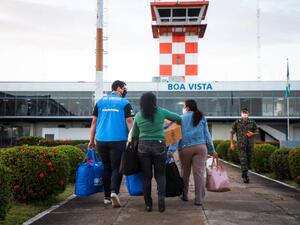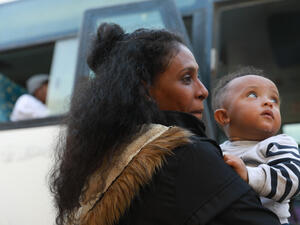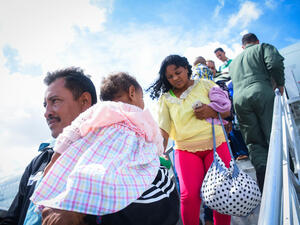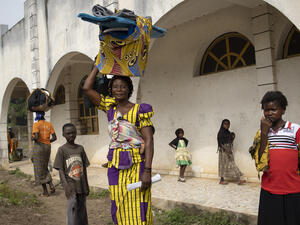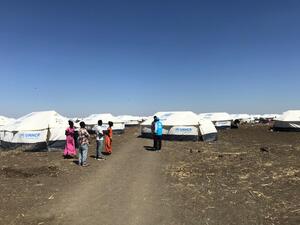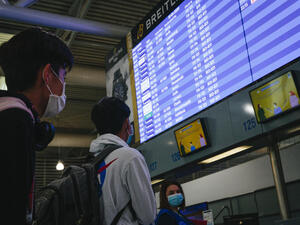Congolese refugees prepare to move to new camps in Burundi
Congolese refugees prepare to move to new camps in Burundi
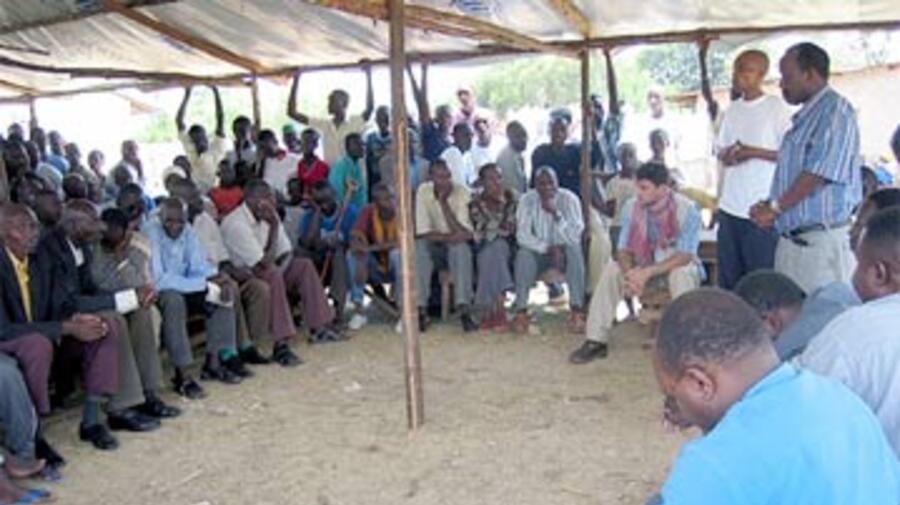
Burundi officials join UNHCR staff in explaining relocation of Congolese refugees to safer sites.
GATUMBA, Burundi, Sept. 15 (UNHCR) - The Gatumba transit centre stands empty. A month after the massacre that killed at least 153 Congolese refugees, no one wants to get near the facility and the horrific memories it brings back. Just down the road, security forces guard a school building, one of two in which the refugees who survived the killings are temporarily sheltered.
Gatumba is located midway on a 30-km stretch of road between Uvira, in the Democratic Republic of the Congo (DRC), and Bujumbura, the Burundian capital. Earlier this year, it was one of three transit centres along Burundi's border for the 20,000 Congolese who fled fighting in June in the DRC's South Kivu province.
On the night of the 13th August, armed men chanting religious songs and beating drums attacked Gatumba, where 870 refugees were sleeping. Eyewitnesses described how the attackers, armed with machetes, automatic weapons and grenades, set plastic tents on fire and went on a killing spree. Most of the dead were women or children. More than 100 others were wounded, including seven UNHCR airlifted to Nairobi in Kenya for medical treatment. Many remain traumatised.
Burundian authorities have informed the Congolese that they need to move from the border to camps farther inland, where their safety can be better assured. UNHCR has started a campaign to inform the refugees of the options available to them and what awaits them in the new camps.
Last week, in a meeting attended by 300 refugees in Gatumba's school, UNHCR Representative Kaba Guichard Neyaga expressed sympathy to the Congolese for their terrible experience. Government officials then explained that a new site had been prepared for the refugees at Gihinga, in Mwaro province, 50 km from Bujumbura. They said those who want to relocate should be ready to move soon. Registration for the transfers, which will take place with UNHCR assistance, is now open. Relocation will go on until the end of September.
The refugees asked about the practical aspects of moving to the new camp, and what life would be like there. One of their biggest concerns was the availability of schools for their children. Neyaga said that schools would be opened, and that all their practical needs - such as food and medical assistance - would be provided. Other refugees said they were worried about moving now, because some of their relatives were still in hospital.
Refugees in Gatumba and the two other transit centres along the border - Rugombo and Karurama - were repeatedly advised to relocate to existing camps farther inside Burundi early in the summer, and again in the immediate aftermath of the attack. The government had stalled on giving approval for use of a site in the interior from the outset, until after the incident occurred. The refugees themselves had been reluctant to move then and still do, saying that they want to be able to return to DRC as soon as the situation there improves.
Following last week's meeting, however, many of Gatumba refugees agreed that it was best for them to move to Gihinga. Located in the hilly Mwaro province, Gihinga is one of two new sites approved by the Burundian government to relocate Congolese refugees. The second site is Giharo, in Rutana province in the east of the country. UNHCR is preparing the necessary infrastructure in the sites to meet the needs of the refugees as they come. It is working with partner agencies to organise shelter, food, water, health, sanitation and access to education.
Refugees who do not wish to relocate to the camps can apply to the Burundian government to register for residency permits in the locality of their choice. Some of the refugees are also opting to return to DRC, where they feel the situation has improved enough to allow them to go back in safety. Rugombo, one of two transit centres in the northern province of Citiboke, was practically empty when UNHCR team visited the area last week. "They have gone back home," the few remaining refugees told the team. "Everyone is going back."
It is difficult to estimate exactly how many have left. UNHCR has not been granted access to the border in recent weeks by the Burundian military, saying the area is insecure.
At this stage, UNHCR's plan is to transfer refugees in Gatumba and Karurama to Mwaro and those remaining at Rugombo to an existing refugee camp in Muyinga province, which still has room for 1,000 people. If more space is needed, Giharo will be opened.
Refugees still in Rugombo, and those in Karurama, now face the same dilemma as the Congolese in Gatumba: to move to safer camp farther inside Burundi, or go back to DRC, something most of the refugees are not yet ready to do.

